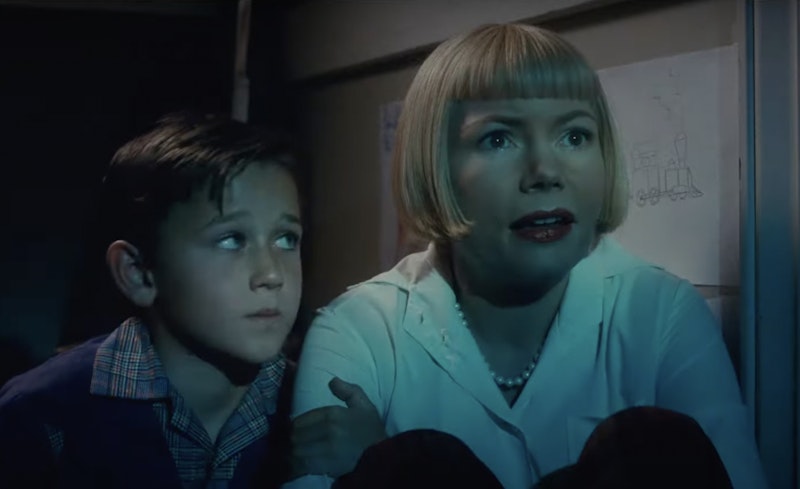It’s obvious now that the critical and awards season success of Roma in 2018, and the commercial success of Once Upon a Time in Hollywood the next year, got a lot of other filmmakers going on their own “memory movies”: this year there’s Armageddon Time by James Gray and The Fabelmans by Steven Spielberg. Last year, it was Paul Thomas Anderson’s Licorice Pizza and Kenneth Branagh’s Belfast. Anderson has never had a hit, and Licorice Pizza was no exception; Belfast only cost $20 million (half of Licorice Pizza) and made about $50 million. But Branagh’s small scale set-bound film, clearly made during 2020 lockdowns, is the relatively inexpensive exception: all of these epic period pieces cost over $40 million. And like his remake of West Side Story last year, Spielberg’s “most personal film” will be seen by many millions fewer people than if it had been released in the fall of 2019.
The Fabelmans is marketed as both a coming-of-age director’s journey and a portrait of a middle-class Jewish family in postwar America. At 161 minutes, the story of Steven Spielberg’s life is apparently not an easy sell. I don’t think its meager box office performance so far is an indication of increased anti-Semitism, but rather a lack of interest in moviemakers making movies about how much they love movies. This is heroin for me, but I’m not going to make Spielberg hundreds of millions of dollars. The Fabelmans is just as accessible and inviting as almost all of his most famous films, but I think the public is losing interest in period pieces about America in the second half of the 20th century. Why go to a movie theater just to be reminded of how much better going to the movies used to be?
Like most of these memory movies, The Fabelmans also has the pall of a eulogy, a two-and-a-half hour concentrate of so much of what makes this medium special. The most exciting characteristic of so many of these films are their meta-textual techniques and sequences of pure cinema that need no exposition. Often, these come in the form of watching characters watch movies, or in The Fabelmans, watch a young “Sammy” (Gabriel LaBelle) direct his first 8mm Western and WWII movies. I’m not a super-fan of Spielberg, but through osmosis, I’ve heard or read most of the stories featured and dramatized in The Fabelmans. I knew what the last scene was going to be as soon as the news broke that David Lynch cameos as John Ford. The filmmaking craft here is superb as always, even if Tony Kushner’s script is a bit broad and unsophisticated. This is a movie that spoon-feeds an audience that’s largely already hip to what’s going on.
And that’s the rub with The Fablemans: who wants to see a movie about how Steven Spielberg became the most successful director of his generation? I’d imagine most people would rather see another great new Spielberg movie, and not a remake of a musical from the 1950s. The cast of The Fabelmans, from Paul Dano and Michelle Williams as the parents Fabelman, to Julia Butters as Sammy’s sister, even down to the anti-Semitic bully played by Oakes Fegley, are phenomenal. The lighting in the beatdown scene in the school hallway towards the end is nuts, like something out of Oshima or Kobayashi. I even buy the absurdity of an Ubermensch jock pulling out a joint in the hallway at prom and casually lighting it up—in 1964. But, like that last scene, it probably really did happen—and what for sure happened was Spielberg refusing the joint, saying, “I’ve already got too much going on in my head.”
Not enough: the craft and many sequences of pure cinema make The Fabelmans a gem, but I’m not surprised that it bombed, and I won’t recommend it as vigorously as some of these other memory movies, even Licorice Pizza, which was far less cohesive but had more style. Spielberg’s early life isn’t that dramatic, and while it’s easy to make any divorce, no matter how amicable, devastating, this isn’t a despairing or traumatized movie. It’s full of love and energy, but it doesn’t feel reflective at all. These are events that happened, these are the events that shaped Spielberg as a man. The Fabelmans is a more cohesive movie than Licorice Pizza, and perhaps better made, but I’m not dying to see it again, and I doubt that I even will. Why? Movie magic? Box office guru Spielberg is probably wondering himself.
—Follow Nicky Smith on Twitter: @nickyotissmith

